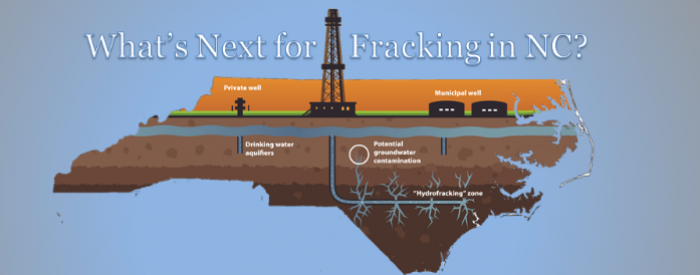Natural gas drilling was recently approved in North Carolina, but new operations are now on hold until the state Supreme Court resolves an issue about the process for appointing environmental review positions.

A North Carolina Superior Court decision earlier this month suspends drilling permits for hydraulic fracturing, or "fracking," until a case filed by Republican Governor Pat McCrory is resolved. The pending Supreme Court decision will determine whether appointments to the state Mining and Energy Commission are valid. The newly-formed Commission has a key role in the fracking permit process, which includes issuing sub-surface mineral rights to applicants before they can seek drilling permits from the North Carolina Department of Environment and Natural Resources.
A separate case filed by the Haw River Assembly is also pending, which involves similar legal questions as the Supreme Court case. At issue is whether the North Carolina state legislature overstepped its role in 2012 by establishing the Mining and Energy Commission, then appointing eight of the 13 members. The governor appoints the remaining five members, and the key legal question is whether sufficient separation of legislative and executive powers is occurring.
The Commission began writing rules and regulations for fracking in 2012, and has received over 220,000 public comments. The prospect of introducing a new form of mining has generated intense public debate, which mainly boils down to job creation and economic development versus environmental safety, and whether ground water supplies can protected from chemical injections needed to extract natural gas from shale deposits
Governor McCrory signed fracking into law in 2014, which would have allowed the permitting process to begin this year, though the extent and location of natural gas deposits has been difficult to pinpoint. So far no drilling permit applications have been submitted.
FULL STORY: Judge temporarily halts 'fracking' permits in NC

Planetizen Federal Action Tracker
A weekly monitor of how Trump’s orders and actions are impacting planners and planning in America.

Chicago’s Ghost Rails
Just beneath the surface of the modern city lie the remnants of its expansive early 20th-century streetcar system.

Amtrak Cutting Jobs, Funding to High-Speed Rail
The agency plans to cut 10 percent of its workforce and has confirmed it will not fund new high-speed rail projects.

Ohio Forces Data Centers to Prepay for Power
Utilities are calling on states to hold data center operators responsible for new energy demands to prevent leaving consumers on the hook for their bills.

MARTA CEO Steps Down Amid Citizenship Concerns
MARTA’s board announced Thursday that its chief, who is from Canada, is resigning due to questions about his immigration status.

Silicon Valley ‘Bike Superhighway’ Awarded $14M State Grant
A Caltrans grant brings the 10-mile Central Bikeway project connecting Santa Clara and East San Jose closer to fruition.
Urban Design for Planners 1: Software Tools
This six-course series explores essential urban design concepts using open source software and equips planners with the tools they need to participate fully in the urban design process.
Planning for Universal Design
Learn the tools for implementing Universal Design in planning regulations.
Caltrans
City of Fort Worth
Mpact (founded as Rail~Volution)
City of Camden Redevelopment Agency
City of Astoria
City of Portland
City of Laramie




























